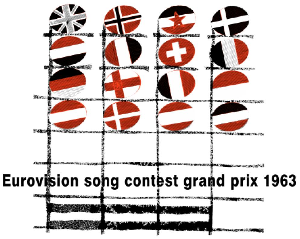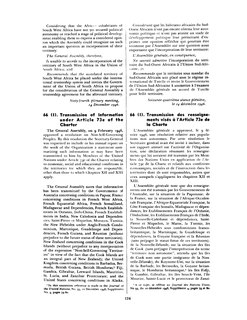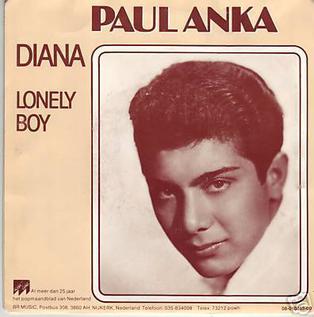Related Research Articles

The Eurovision Song Contest 1963 was the eighth edition of the annual Eurovision Song Contest and took place in London, United Kingdom. It was organised by the European Broadcasting Union (EBU) and host broadcaster British Broadcasting Corporation (BBC), who agreed to stage the event after France, who had won the 1962 edition, declined to host it due to financial shortcomings, also having hosted the competition in 1959 and 1961. The contest was held at the BBC Television Centre on Saturday 23 March 1963 and was hosted by Katie Boyle for a second time.

Al Martino was an American singer and actor. He had his greatest success as a singer between the early 1950s and mid-1970s, being described as "one of the great Italian American pop crooners", and also became known as an actor, particularly for his role as singer Johnny Fontane in The Godfather.

Ligue 1, officially known as Ligue 1 Uber Eats for sponsorship reasons, is a French professional league for men's association football clubs. At the top of the French football league system, it is the country's primary football competition. Administrated by the Ligue de Football Professionnel, Ligue 1 is contested by 20 clubs and operates on a system of promotion and relegation from and to Ligue 2.

Chapter XI of the United Nations Charter refers to a non-self-governing territory (NSGT) as a territory "whose people have not yet attained a full measure of self-government." In practice, a NSGT is a territory deemed by the United Nations General Assembly (UNGA) to be "non-self-governing". Chapter XI of the UN Charter also includes a "Declaration on Non-Self-Governing Territories" that the interests of the occupants of dependent territories are paramount and requires member states of the United Nations in control of such territories to submit annual information reports concerning the development of those territories. Since 1946, the UNGA has maintained a list of non-self governing territories under member states' control. Since its inception, dozens of territories have been removed from the list, typically when they attained independence or internal self-government, while other territories have been added as new administering countries joined the United Nations or the General Assembly reassessed the status of certain territories.

"Denise" is a song written by Neil Levenson that was inspired by his childhood friend, Denise Lefrak. In 1963, it became a popular top ten hit on the Billboard Hot 100 chart, when recorded by the American doo-wop group Randy & the Rainbows. A cover version by the American new wave group Blondie, re-titled "Denis", hit number 2 in the UK Singles Chart in 1978. Dutch actress and singer Georgina Verbaan covered "Denis" in 2002 and reached number 30 on the Dutch Singles Chart.

"Heat Wave" is a 1963 song written by the Holland–Dozier–Holland songwriting team. It was first made popular by the Motown vocal group Martha and the Vandellas. Released as a 45 rpm single on July 9, 1963, on the Motown subsidiary Gordy label, it hit number one on the Billboard Hot R&B chart—where it stayed for four weeks—and peaking at number 4 on the Billboard Hot 100.

"Diana" is a song written and first performed by Paul Anka, who recorded it in May 1957 at Don Costa’s studio in New York City. Anka stated in his autobiography that the song was inspired by a girl named Diana Ayoub, whom he had met at his church and community events, and had developed a crush on. Session musicians on the record included Bucky Pizzarelli on guitar, Irving Wexler on piano, Jerry Bruno on bass, and Panama Francis on drums. The song was recorded in May 1957 at RCA Studios in New York. Backup singers included Artie Ripp.

"Stay" is a doo-wop song written by Maurice Williams and first recorded in 1960 by Williams with his group the Zodiacs. Commercially successful versions were later also issued by The Hollies, The Four Seasons and Jackson Browne.
"It's All in the Game" is a pop song whose most successful version was recorded by Tommy Edwards in 1958. Carl Sigman composed the lyrics in 1951 to a wordless 1911 composition titled "Melody in A Major", written by Charles G. Dawes, who was later Vice President of the United States under Calvin Coolidge. It is the only No. 1 single in the U.S. to have been co-written by a U.S. Vice President or a Nobel Peace Prize laureate.

"Do Wah Diddy Diddy" is a song written by Jeff Barry and Ellie Greenwich and originally recorded in 1963, as "Do-Wah-Diddy", by the American vocal group The Exciters. Cash Box described the Exciters' version as "a sparkling rocker that bubbles over with coin-catching enthusiasm" and said that the "great lead job is backed by a fabulous instrumental arrangement." It was made internationally famous by the British band Manfred Mann.

"Break It to Me Gently" is a pop song written by blues musician Joe Seneca with lyrics by Diane Lampert. Both Brenda Lee and Juice Newton met with considerable success with their versions of the song.

The Puducherry Legislative Assembly is the unicameral legislature of the Indian union territory (UT) of Puducherry, which comprises four districts: Puducherry, Karaikal, Mahé and Yanam. The legislative assembly has 33 seats, of which 5 are reserved for candidates from scheduled castes and 3 members are nominated by the Government of India. 30 out of 33 Members are elected directly by the people on the basis of universal adult franchise.

"Rhythm of the Rain" is a song performed by The Cascades, released in November 1962. It was written by Cascades band member John Claude Gummoe. On March 9, 1963, it rose to number 3 on the Billboard Hot 100, and spent two weeks at number 1 on Billboard's Easy Listening chart. Billboard ranked the record as the number 4 song of 1963.

"The Next Time" backed with "Bachelor Boy" was the first of three number one hit singles from the Cliff Richard musical, Summer Holiday. Both sides were marketed as songs with chart potential, and the release is viewed retroactively as a double A-side single. However, technically double A-sides were not regarded as such until 1965, so "The Next Time" was pressed as the A-side, with "Bachelor Boy" the B-side. The song was succeeded at number one by The Shadows' "Dance On!".

"Da Doo Ron Ron" is a song written by Jeff Barry, Ellie Greenwich and Phil Spector. It first became a popular top five hit single for the American girl group The Crystals in 1963. American teen idol Shaun Cassidy covered the song in 1977 and his version hit number one on the Billboard Hot 100 chart. There have also been many other cover versions of this song, including one by the songwriters Jeff Barry and Ellie Greenwich themselves, performing as The Raindrops.
No. 97 Squadron, was a Royal Air Force squadron formed on 1 December 1917 at Waddington, Lincolnshire.

"Summer Holiday" is a song recorded by Cliff Richard and the Shadows, written by rhythm guitarist Bruce Welch and drummer Brian Bennett. It is taken from the film of the same name, and was released as the second single from the film in February 1963. It went to number one in the UK Singles Chart for a total of two weeks. After that, the Shadows' instrumental "Foot Tapper"—also from the same film—took over the top spot for one week, before "Summer Holiday" returned to the top spot for one further week. The track is one of Richard's best known titles and it remains a staple of his live shows. It was one of six hits Richard performed at his spontaneous gig at the 1996 Wimbledon Championships when rain stopped the tennis.

"Bachelor Boy" is a song by Cliff Richard and the Shadows, written by Richard and Bruce Welch. It became a hit when it was released as the B-side of Richard's single "The Next Time". Both sides of the single were regarded as having chart potential so both sides were promoted and in many markets "Bachelor Boy" became the bigger hit. The single spent three weeks at No. 1 in the UK Singles Chart in January 1963 and was a major hit internationally, although it only reached No. 99 in the US. Both sides of the single were included on the accompanying soundtrack album Summer Holiday. On the soundtrack album the Michael Sammes Singers were credited as backing singers, although they were not credited on the single.
"We Say Yeah" is a song originally performed by Cliff Richard & The Shadows. It was initially released in December 1961 on "The Young Ones" soundtrack album and a few weeks later the B-side to "The Young Ones" single. Both reached number 1 in their respective UK charts. In France however, it was the rousing "We Say Yeah" instead of "The Young Ones" that made the singles chart, reaching number 14.
References
- ↑ Archives on "InfoDisc" site Archived 2010-01-07 at the Wayback Machine